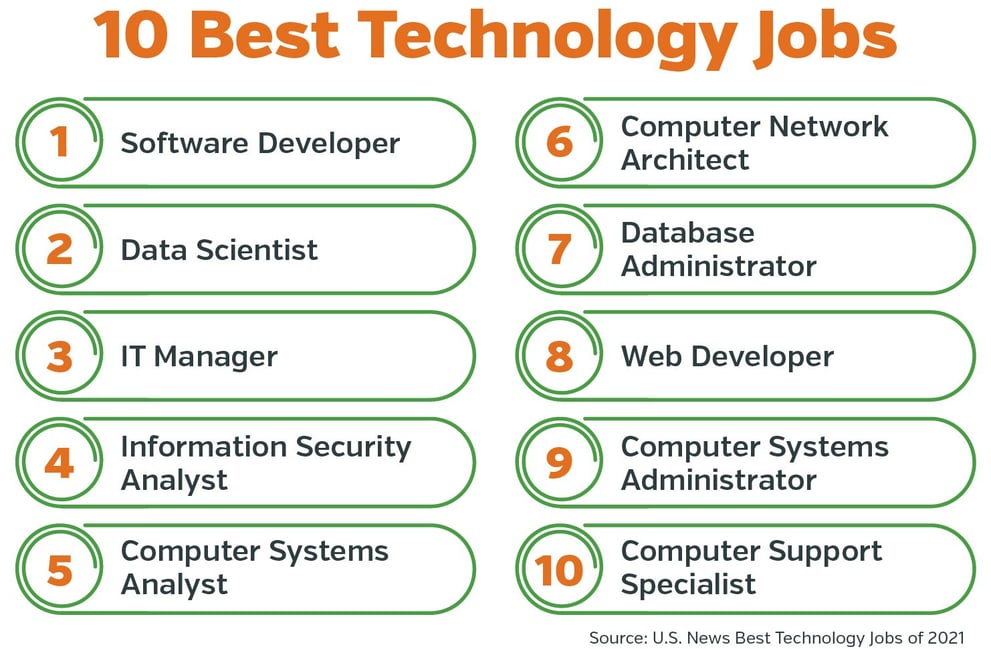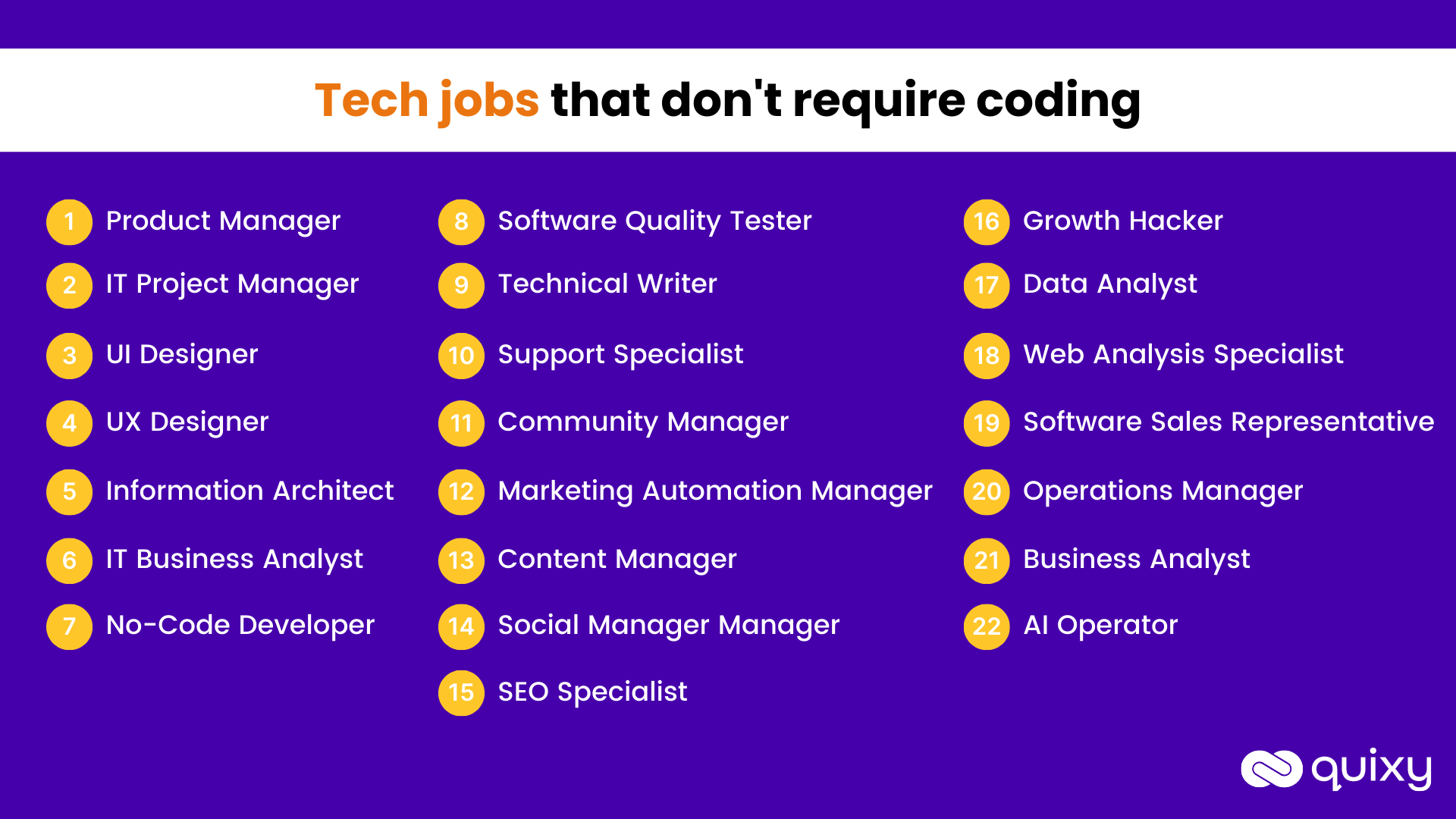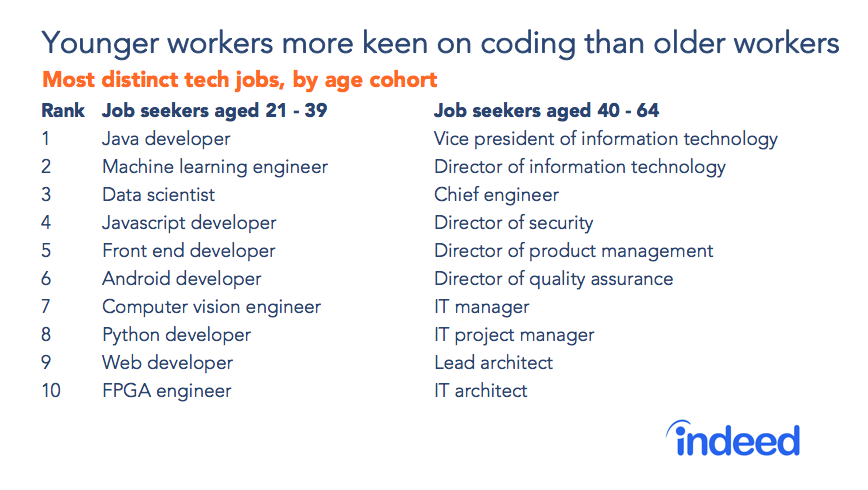The tech industry is booming. Opportunities are everywhere.
List of Tech Jobs From coding to cybersecurity, tech jobs are in high demand. More businesses rely on technology, and they need skilled professionals. Whether you love problem-solving, coding, or designing, there’s a tech job for you. These roles not only offer good salaries but also a chance to work on exciting projects.
The variety of tech jobs means you can find something that fits your skills and interests. Ready to explore the world of tech careers? Let’s dive in and see what opportunities await you.

Credit: www.genesis10.com
Emerging Tech Roles
Technology is changing fast. New job roles are emerging every day. These roles are shaping the future. Companies need skilled workers to fill these positions. This blog post will cover some of the hottest emerging tech roles.
Ai Specialists
AI Specialists are in high demand. They create intelligent systems. These systems can learn and make decisions. Here are some key tasks they handle:
- Designing algorithms
- Training machine learning models
- Analyzing data
- Improving system performance
AI Specialists work in many industries. Healthcare, finance, and retail need their skills. They help businesses make better decisions. They also automate tasks. This saves time and money.
To become an AI Specialist, you need skills in:
- Programming languages like Python and R
- Mathematics and statistics
- Data analysis
- Machine learning frameworks like TensorFlow and PyTorch
Here is a quick look at their average salaries:
| Country | Average Salary |
|---|---|
| USA | $120,000 |
| UK | £85,000 |
| India | ₹15,00,000 |
AI Specialists are vital. Their work impacts many fields. They push technology forward.
Blockchain Developers
Blockchain Developers create and maintain blockchain systems. These systems are secure and transparent. They are used in many areas, like finance and supply chain. Key responsibilities include:
- Developing blockchain protocols
- Writing smart contracts
- Ensuring system security
- Testing and debugging code
Blockchain Developers need strong technical skills. They must understand:
- Cryptography
- Decentralized applications (DApps)
- Consensus algorithms
- Programming languages like Solidity and Go
Here is a brief overview of their average salaries:
| Country | Average Salary |
|---|---|
| USA | $130,000 |
| UK | £90,000 |
| India | ₹16,00,000 |
Blockchain Developers ensure data integrity. Their work is crucial. They help build trust in digital transactions.

Credit: quixy.com
Software Development
In the world of tech jobs, software development stands out as a key field. It involves creating, designing, and maintaining software applications. Software developers play a crucial role in the tech industry, ensuring that programs run smoothly and efficiently. Their work is divided into different specialties, such as front-end and back-end development. Each of these roles is vital in building comprehensive and user-friendly software solutions.
Front-end Developers
Front-end developers focus on the visual aspects of a website or application. They ensure that users interact smoothly with the software interface. This role combines both creativity and technical skills.
Key responsibilities include:
- Designing user interfaces (UI)
- Developing interactive features
- Ensuring cross-browser compatibility
- Optimizing performance for speed and scalability
- Collaborating with designers and back-end developers
Common technologies used by front-end developers are:
| Technology | Description |
|---|---|
| HTML | Structure of web pages |
| CSS | Styling of web pages |
| JavaScript | Interactive elements on web pages |
| React | Library for building user interfaces |
| Angular | Framework for dynamic web apps |
Front-end developers must have an eye for detail. They also need to understand user experience (UX) principles. Their work ensures that the final product is both visually appealing and functional.
Back-end Developers
Back-end developers deal with the server side of applications. They ensure that the server, application, and database communicate properly. This role is essential for the overall functionality of software systems.
Key responsibilities include:
- Developing server-side logic
- Integrating front-end elements with server-side logic
- Ensuring data security
- Managing database operations
- Optimizing server performance
Common technologies used by back-end developers are:
| Technology | Description |
|---|---|
| Node.js | JavaScript runtime for server-side programming |
| Python | Programming language for web development |
| Ruby on Rails | Web application framework |
| SQL | Language for database management |
| Java | Programming language for large-scale applications |
Back-end developers must have strong problem-solving skills. They should also be proficient in various programming languages. Their work ensures the robustness and reliability of the software.
Data Science Careers
In the world of technology, data science careers are among the most rewarding and in-demand. Companies rely on data to make informed decisions, improve operations, and understand their customers better. This growing need for data-driven insights has led to a surge in job opportunities within the field of data science. Let’s explore some of the top careers in this exciting industry.
Data Analysts
Data Analysts play a crucial role in any organization. They gather, process, and analyze data to help businesses make better decisions. Their work involves:
- Collecting data from various sources
- Cleaning and organizing data
- Using statistical tools to interpret data sets
- Identifying trends and patterns
- Creating reports and visualizations
Data Analysts typically use tools such as Excel, SQL, and various data visualization software like Tableau or Power BI. They need strong analytical skills, attention to detail, and the ability to communicate findings effectively. This role is perfect for those who enjoy working with numbers and solving problems.
| Key Skills | Tools |
|---|---|
| Analytical Thinking | Excel, SQL |
| Data Cleaning | Python, R |
| Data Visualization | Tableau, Power BI |
Data Engineers
Data Engineers focus on the infrastructure and architecture for data generation, collection, and storage. They ensure that data is accessible and usable for analysis. Their responsibilities include:
- Designing and building data pipelines
- Developing algorithms to transform data
- Maintaining and optimizing databases
- Ensuring data quality and integrity
- Collaborating with data scientists and analysts
Data Engineers use technologies like Hadoop, Spark, and various cloud platforms such as AWS and Azure. They need strong programming skills, knowledge of database systems, and an understanding of distributed computing. This role suits those who love building systems and working with large-scale data.
| Key Skills | Technologies |
|---|---|
| Programming | Python, Java |
| Database Management | SQL, NoSQL |
| Big Data Technologies | Hadoop, Spark |
Cybersecurity Positions
In the fast-evolving world of technology, the demand for skilled professionals in cybersecurity positions continues to grow. These roles are crucial in safeguarding sensitive information and protecting against cyber threats. The following sections explore key positions in cybersecurity: Security Analysts and Penetration Testers.
Security Analysts
Security Analysts play a pivotal role in maintaining the security of an organization’s data and systems. They are responsible for identifying vulnerabilities and implementing measures to protect against cyber attacks. Here are some of their key responsibilities:
- Monitoring Security Systems: Continuously oversee security systems to detect suspicious activity.
- Investigating Security Breaches: Analyze incidents to understand how breaches occurred and how to prevent future attacks.
- Developing Security Plans: Create comprehensive security strategies to safeguard sensitive information.
Security Analysts often work with various tools and technologies to perform their duties. A typical day might involve:
| Task | Description |
|---|---|
| Real-time Monitoring | Using software to track network activity and detect threats. |
| Incident Response | Reacting quickly to security breaches and mitigating damage. |
| Reporting | Documenting security incidents and creating reports for management. |
Security Analysts need a deep understanding of network protocols, firewalls, and antivirus software. They often hold certifications such as Certified Information Systems Security Professional (CISSP) or Certified Ethical Hacker (CEH).
Penetration Testers
Penetration Testers, also known as ethical hackers, simulate cyber attacks to find and fix security weaknesses. They think like hackers but work for the good of the organization. Their main tasks include:
- Conducting Pen Tests: Perform authorized attacks to identify vulnerabilities.
- Reporting Findings: Document and explain security issues to stakeholders.
- Recommending Fixes: Suggest improvements to strengthen security defenses.
Penetration Testers use a variety of tools and techniques, such as:
| Tool/Technique | Purpose |
|---|---|
| Vulnerability Scanners | Identify weak spots in systems. |
| Exploitation Frameworks | Test the effectiveness of security measures. |
| Social Engineering | Trick employees into revealing sensitive information. |
Penetration Testers often need certifications like Offensive Security Certified Professional (OSCP) or GIAC Penetration Tester (GPEN). They must stay updated with the latest hacking techniques and security trends.
It Support Roles
The world of technology is vast and ever-evolving. One of the key areas within the tech industry is IT support roles. These positions are essential to ensure the smooth operation of any company’s tech infrastructure. IT support professionals help maintain, troubleshoot, and repair computer systems and networks. Below, we delve into two critical IT support roles: Help Desk Technicians and System Administrators.
Help Desk Technicians
Help Desk Technicians are the frontline support staff who interact directly with users. They provide solutions to software and hardware issues. These technicians play a crucial role in maintaining user satisfaction and productivity. Key responsibilities include:
- Responding to user inquiries via phone, email, or chat.
- Diagnosing technical issues and providing step-by-step resolutions.
- Installing and configuring software applications.
- Maintaining and updating knowledge bases for common issues.
- Escalating complex problems to higher-level support or specialized teams.
Help Desk Technicians need strong communication skills. They must explain technical concepts in simple terms. This role often serves as a stepping stone to more advanced IT positions.
| Skill | Description |
|---|---|
| Technical Knowledge | Understanding of operating systems, hardware, and software. |
| Problem-Solving | Ability to diagnose and resolve technical issues quickly. |
| Communication | Clear and effective interaction with users. |
System Administrators
System Administrators, or sysadmins, manage and maintain the IT infrastructure of an organization. Their responsibilities are more complex than those of Help Desk Technicians. A sysadmin’s duties include:
- Installing and configuring server hardware and software.
- Monitoring system performance and ensuring reliability and availability.
- Implementing security measures to protect data and systems.
- Managing user accounts and access controls.
- Backing up data and ensuring disaster recovery plans are in place.
System Administrators need a deep understanding of network and system administration. They often work behind the scenes to ensure that everything runs smoothly. This role is vital for the overall health of the company’s IT systems.
| Skill | Description |
|---|---|
| Network Management | Ensuring stable and secure network operations. |
| Security | Protecting systems from cyber threats and breaches. |
| Data Backup | Regularly backing up data to prevent loss. |
Both Help Desk Technicians and System Administrators are essential in maintaining a company’s IT health. These roles require different skill sets but are equally important in supporting the technology infrastructure of any organization.

Credit: www.hiringlab.org
Ux/ui Design Jobs
In today’s tech-driven world, UX/UI design jobs are in high demand. These roles focus on creating user-friendly interfaces for digital products. They ensure that users have a seamless and engaging experience. UX/UI design is a critical part of product development, as it combines aesthetics with functionality. There are various roles within this field, such as UX Researchers and UI Designers. Let’s dive deeper into these exciting careers.
Ux Researchers
UX Researchers play a vital role in the design process. They gather and analyze data to understand user behavior and needs. This information helps designers create products that are easy to use and meet user expectations.
Typical responsibilities of a UX Researcher include:
- Conducting user interviews and surveys
- Analyzing user feedback and data
- Creating user personas and journey maps
- Testing prototypes with real users
- Collaborating with designers and developers
Key skills for UX Researchers are:
| Skill | Description |
|---|---|
| Analytical Thinking | Ability to interpret data and draw insights |
| Communication | Effectively conveying research findings to the team |
| Empathy | Understanding user needs and pain points |
Ui Designers
UI Designers focus on the visual aspects of a product. They design the layout, colors, typography, and interactive elements. Their goal is to create an attractive and intuitive interface that enhances the user experience.
Typical responsibilities of a UI Designer include:
- Designing interface elements like buttons and icons
- Creating wireframes and mockups
- Ensuring design consistency across the product
- Collaborating with UX Researchers and Developers
- Keeping up with design trends and best practices
Key skills for UI Designers are:
| Skill | Description |
|---|---|
| Visual Design | Creating appealing and functional designs |
| Prototyping | Building interactive mockups for user testing |
| Attention to Detail | Ensuring every design element is pixel-perfect |
Cloud Computing
Cloud computing has transformed the tech industry by providing scalable, flexible, and cost-effective solutions. It offers a range of job opportunities for tech professionals. In this blog post, we explore some of the top tech jobs in cloud computing.
Cloud Architects
Cloud Architects design and manage an organization’s cloud computing strategy. They create blueprints for application designs and deployments. This role requires a deep understanding of cloud services like AWS, Azure, and Google Cloud.
Key Responsibilities:
- Designing cloud environments based on business needs
- Ensuring security and compliance
- Optimizing cloud services for cost and performance
- Collaborating with IT teams to implement cloud solutions
Skills Required:
- Proficiency in cloud platforms (AWS, Azure, Google Cloud)
- Experience with cloud architecture and design patterns
- Understanding of cloud security principles
- Strong communication and leadership skills
A typical day for a Cloud Architect might involve meeting with stakeholders to understand their requirements. Then, they design cloud solutions to meet those needs. They also monitor the performance of cloud systems and make adjustments as necessary. This role is crucial for organizations looking to leverage cloud technology for their operations.
Devops Engineers
DevOps Engineers bridge the gap between development and operations teams. They automate processes to improve efficiency and collaboration. Their work ensures that software development and deployment are streamlined and reliable.
Key Responsibilities:
- Automating deployment processes
- Maintaining and improving CI/CD pipelines
- Monitoring system performance and reliability
- Collaborating with development and IT teams
Skills Required:
- Experience with automation tools (Jenkins, Ansible, Puppet)
- Proficiency in scripting languages (Python, Bash)
- Understanding of containerization (Docker, Kubernetes)
- Knowledge of cloud services (AWS, Azure)
A day in the life of a DevOps Engineer includes writing scripts to automate tasks. They also set up monitoring tools to track system performance. They work closely with developers to ensure that code is deployed smoothly. This role is essential for maintaining fast and reliable software delivery.
Network Engineering
Technology jobs are always evolving. Network engineering is a key area. It involves designing, implementing, and managing computer networks. These networks connect devices and systems. This ensures smooth communication and data sharing. Network engineering has many roles. Two important roles are Network Administrators and Network Architects.
Network Administrators
Network Administrators play a vital role in any organization. They manage and maintain computer networks. Their duties include:
- Installing network hardware and software
- Monitoring network performance
- Troubleshooting network issues
- Ensuring network security
- Updating system configurations
Network Administrators need strong technical skills. They must understand various networking protocols and tools. Some key skills include:
| Skill | Description |
|---|---|
| TCP/IP | Understanding of Transmission Control Protocol/Internet Protocol |
| DNS | Domain Name System management |
| Firewall Management | Configuring and maintaining firewalls |
| Network Security | Implementing security measures |
Network Administrators also need good problem-solving skills. They must quickly fix issues to avoid downtime. Communication skills are important too. They often work with other IT staff and users. Explaining complex technical issues in simple terms is crucial. Certifications can boost a Network Administrator’s career. Common certifications include:
- CompTIA Network+
- Cisco Certified Network Associate (CCNA)
- Microsoft Certified: Azure Network Engineer Associate
Network Architects
Network Architects design and build computer networks. This includes local area networks (LANs), wide area networks (WANs), and intranets. They create network plans and layouts. Their responsibilities include:
- Designing network infrastructure
- Assessing business needs
- Creating network models
- Choosing appropriate hardware and software
- Ensuring network scalability
Network Architects need advanced technical skills. They must understand complex network systems. Some key skills include:
| Skill | Description |
|---|---|
| Network Design | Creating detailed network blueprints |
| Cloud Computing | Designing networks for cloud environments |
| Virtualization | Creating virtual networks |
| Security Architecture | Implementing secure network designs |
Network Architects need strong analytical skills. They evaluate network performance and make improvements. They also need good project management skills. They often oversee large projects from start to finish. Certifications can enhance a Network Architect’s career. Common certifications include:
- Cisco Certified Internetwork Expert (CCIE)
- Certified Information Systems Security Professional (CISSP)
- VMware Certified Professional – Network Virtualization (VCP-NV)
Frequently Asked Questions
What Are The Top Tech Jobs In Demand?
Top tech jobs in demand include software developers, data scientists, and cybersecurity experts. These roles are highly sought after due to growing digital needs.
How Can I Become A Software Developer?
To become a software developer, learn programming languages like Python or Java. Obtain a relevant degree and gain practical experience through projects or internships.
What Skills Are Needed For Data Science Jobs?
Data science jobs require skills in statistics, programming, and data visualization. Proficiency in tools like Python, R, and SQL is essential.
Why Is Cybersecurity Important In Tech Jobs?
Cybersecurity is crucial to protect sensitive data from cyber threats. It ensures the integrity, confidentiality, and availability of information, making it vital in tech jobs.
Conclusion
Exploring tech jobs can lead to exciting career opportunities. The industry offers diverse roles. From software developers to data analysts, there’s something for everyone. Tech jobs provide good salaries and growth potential. They also offer chances to work on innovative projects.
Stay updated with new skills to remain competitive. Tech is always evolving, so continuous learning is key. Start your tech journey today and discover a path that suits your interests and talents. With determination and passion, a rewarding tech career awaits you.
